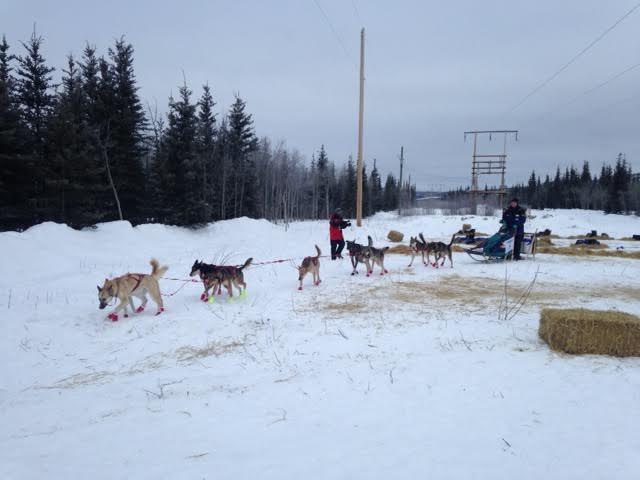The Yukon Quest is winding down. The last musher, Canadian rookie Gaeton Pierrard is expected to cross the finish line early Friday morning. Running at the back of the pack can be just as trying and rewarding as racing at the front. That was the case for rookie mushers Andy Pace and Laura Neese.

Neese, the youngest musher in the Yukon Quest, finished the race on Wednesday night in thirteenth place. Earlier that day, with only a hundred miles left, said she wasn’t ready for it to be over.
“Then we got in here it hit me, this is the last checkpoint,” said Neese. “I don’t want to be done.”
Last week, a blizzard on American Summit brought several mushers to their knees, stranding some in cabins and forcing others to camp in the howling snow. Several were still in shock when they came into Dawson City.
But Neese said it was her favorite part of the race.
“The storm was really cool just to see the dogs in that new experience,” Neese said.
Neese is 19 years old, and has dreamed of running the Yukon Quest since elementary school. She finished high school and college early to become a long-distance dog musher. In the mountains between Eagle and Dawson, she ran into the worst conditions she has ever seen. The trail had been wiped out by snow and wind, and she had to break through deep snowdrifts.
“Drifts were deep enough the dogs were just swimming in them,” said Neese.
Not only did Neese make it through with a smile, she helped another musher through too.
Andrew Pace is a 36-year-old rookie from Healy. His team started the race strong, but partway through he had to drop his lead dog, Solo, because of pneumonia. When he left Eagle and headed into the mountains, he was missing his main leader.
He made it over the first summit, but started having trouble on the second one.
“Then the wind started coming, snow started coming, ice snow, it was pretty nasty,” said Pace.
Pace was working as hard as he could to help his dogs up the hill, running, ski poling, and kicking to give them more momentum, but they just didn’t want to pull.
“I was just drenched in sweat,” Pace said. “And I had already done that on American Summit so my backup clothes were already ice blocks in my sled.”
With no other options, he stopped to camp again. Because they were moving so slow between checkpoints, he had run out of dry clothes and dog food. He was worried that he might have to activate his emergency beacon and scratch from the race.
“At that point I just thought, I don’t want to do it,” said Pace. “But if I don’t have another dog team to follow in right now I’m gonna have to press the button or I’m going to have to walk them in.”
On long distances or rough conditions, dogs can lose the will to pull. Sometimes, all they need is something to chase. So Pace wrote a note and posted it on his ski pole next to the trail, hoping a musher would see it.
The note read: “Dog team won’t go. Help. Hung it up, got in my sleeping bag and went to sleep for a little bit.”
Soon he saw a headlamp coming over the hill. Neese had been seeing Pace’s tracks for awhile. She didn’t know who it was, but she could tell they were having trouble.
“Came up on it and it was obvious he was camped not planning to be camped,” Neese said. “So I passed and stopped an asked if he wanted to follow.”
He did. Pace lined out his team and started running again, following Neese through the night. Every few minutes, he saw the flash of a headlamp as she turned around to check on him. Soon, his dogs were back in race mode.
“Oddly enough that last run I was riding the brake like a banshee again,” said Pace.
Pace said the teenage musher was his savior that day.
“She was awesome,” Pace said of Neese. “She was super absolutely whatever you need, really nice and really calm. She’s really good with her dogs.”
Neese said she learned a lot from her first thousand-mile race, and sees more of them in her future.
“Oh yeah, I’ll be back next year,” Neese said.
Pace came into Braeburn Wednesday morning, just as Neese was taking off.
He said he learned a lot about leadership from his first Yukon Quest. When he dropped his lead dog, Solo, it totally changed the dynamic of his team. He was feeling deflated, and the dogs picked up on it.
“I feel closer to recognizing how to help them and encourage them and how to lead with them,” Pace said.




